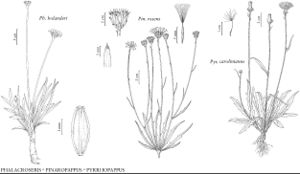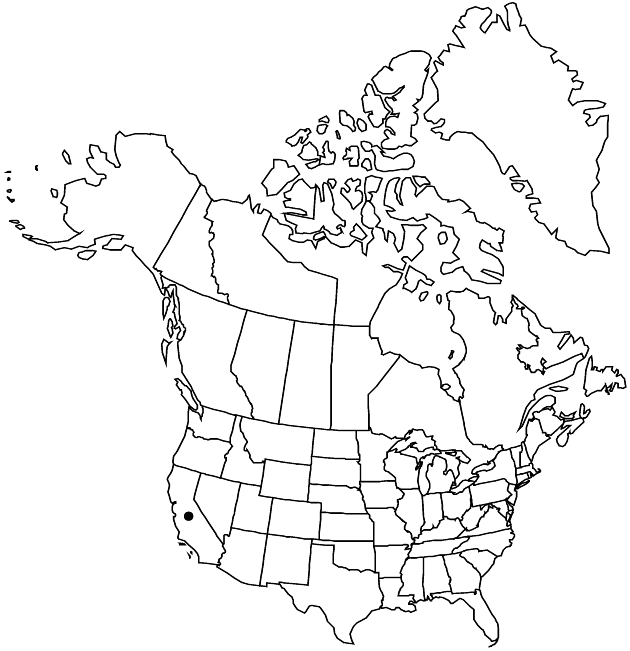Difference between revisions of "Phalacroseris bolanderi"
Proc. Amer. Acad. Arts 7: 364. 1868.
Common names: Bolander dandelion
IllustratedEndemic
Synonyms: Phalacroseris bolanderi var. coronata H. M. Hall
Treatment appears in FNA Volume 19. Treatment on page 374.
FNA>Volume Importer |
imported>Volume Importer |
||
| (5 intermediate revisions by 2 users not shown) | |||
| Line 8: | Line 8: | ||
}} | }} | ||
|common_names=Bolander dandelion | |common_names=Bolander dandelion | ||
| + | |special_status={{Treatment/ID/Special_status | ||
| + | |code=F | ||
| + | |label=Illustrated | ||
| + | }}{{Treatment/ID/Special_status | ||
| + | |code=E | ||
| + | |label=Endemic | ||
| + | }} | ||
|basionyms= | |basionyms= | ||
|synonyms={{Treatment/ID/Synonym | |synonyms={{Treatment/ID/Synonym | ||
|name=Phalacroseris bolanderi var. coronata | |name=Phalacroseris bolanderi var. coronata | ||
|authority=H. M. Hall | |authority=H. M. Hall | ||
| + | |rank=variety | ||
}} | }} | ||
|hierarchy=Asteraceae;Asteraceae tribe Cichorieae;Phalacroseris;Phalacroseris bolanderi | |hierarchy=Asteraceae;Asteraceae tribe Cichorieae;Phalacroseris;Phalacroseris bolanderi | ||
| Line 36: | Line 44: | ||
-->{{#Taxon: | -->{{#Taxon: | ||
name=Phalacroseris bolanderi | name=Phalacroseris bolanderi | ||
| − | |||
|authority=A. Gray | |authority=A. Gray | ||
|rank=species | |rank=species | ||
| Line 50: | Line 57: | ||
|publication title=Proc. Amer. Acad. Arts | |publication title=Proc. Amer. Acad. Arts | ||
|publication year=1868 | |publication year=1868 | ||
| − | |special status= | + | |special status=Illustrated;Endemic |
| − | |source xml=https:// | + | |source xml=https://bitbucket.org/aafc-mbb/fna-data-curation/src/2e0870ddd59836b60bcf96646a41e87ea5a5943a/coarse_grained_fna_xml/V19-20-21/V19_603.xml |
|tribe=Asteraceae tribe Cichorieae | |tribe=Asteraceae tribe Cichorieae | ||
|genus=Phalacroseris | |genus=Phalacroseris | ||
Latest revision as of 19:53, 5 November 2020
Leaves 6–20 cm, faces glabrous. Involucres 7–13 mm after flowering. Phyllaries not reflexed in fruit, margins often red distally, glabrous or minutely puberulent apically. Florets 10–18 mm, much surpassing phyllaries at flowering, glabrous. Cypselae straight or slightly curved on one side, 3–4 mm, obtusely 3-angled at 1 adaxial and 2 lateral nerves. 2n = 18.
Phenology: Flowering Jun–Aug.
Habitat: Wet meadows and sphagnum bogs, coniferous upper montane forests and mixed subalpine woodlands
Elevation: 1800–3000 m
Discussion
A vestigial coroniform pappus found in some individuals is too minor a feature to merit varietal designation.
Selected References
None.
Lower Taxa
None.

